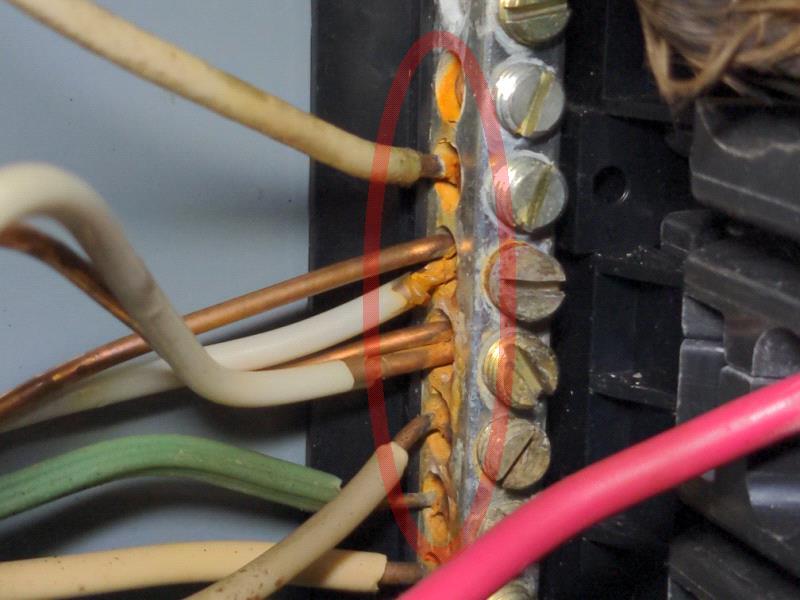NJ home inspectors should inspect for and identify moisture or water entry into a home’s electrical panel box. The home inspection standards of practice in NJ indicate that we as home inspectors should remove the panel box cover and inspect the interior of the panel box for defects and safety hazards. One of the safety hazards that is sometimes discovered is rusting or corrosion inside the electrical panel. Moisture can rust and corode breakers, terminals, bus bars and wiring.
As home inspectors we are trained to inspect for the presence of rust and white corrosion inside the panel box which indicate that moisture is entering the panel. Water and electoral are an unsafe combination and problems with moisture should be reported on.
How does moisture enter a panel box?
The first way is through a frayed or damaged main electrical service wire. If the service wire is nicked, chipped or frayed water can enter and travel to the meter and then make its way into the panel. Water will travel down the conductor wiring and end up inside the panel. Once moisture is inside it will rust and corrode the breakers, terminals, bus bars and wiring creating a significant safety hazard. Home inspectors should be inspecting the main electrical service wire to the home and reporting on any damage or defects. A damaged main electrical service wire is a safety hazard.
The second way that moisture can enter an electrical panel box is through a damaged or missing weather head. The weatherhead is the cap that sits on the top of the electrical service mast. The weatherhead has a downward curve that helps prevent water from entering. If the weather head is damaged or missing water can enter and travel down the service wires and then enter the electrical panel causing the safety hazard. As NJ home inspectors we should be looking for an intact and in place weather head. If the weather head is missing or damaged an electrical contractor should be bought in to replace it.
The third way that water can enter an electrical service panel is by having a missing or poorly configured drip loop. Drip loop defects can cause water or moisture to travel down the service wires. A drip loop is a loop or dip in the main service wires that is installed before the lines enter the weather head. Its purpose is to allow water to drop down and off the service wires rather than having a pathway to enter the weather head. Home inspectors in New Jersey should inspect for the presence of and proper installation of a service entrance drip loop.
The other major way that water can enter an electrical panel is having a missing or brittle seal on top of the meter pan where the service wires enter the meter. This putty is called duct seal and does get brittle over time or sometimes its missing altogether. If the duct seal is missing or cracked water can enter and travel down the service wires making its way into the electrical panel box. NJ home inspectors should check for missing duct seal and recommend replacement if the duct seal is in poor condition.
If home inspectors do find electrical defects that would allow water to enter the electrical panel box, they should recommend that an electrical contractor correct the issues. If home inspectors find evidence of rusting or corrosion inside the panel box, then they should recommend that an electrical contractor determine if the panel is salvageable or repairable or does the panel box have to be replaced. In most cases electrical contractors will recommend that the panel box be replaced for safety reasons.
In conclusion Hoe inspectors should be inspecting the inside of electrical panel boxes for evidence of moisture damage. New Jersey home inspectors should be inspecting the main electrical service drop for problems that can allow moisture or water to enter the electrical panel box.

